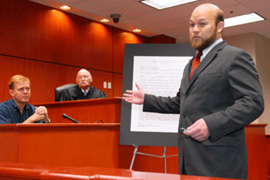Internet Trolls Use Texas’ Anti-SLAPP Statute To Collect Money From Their Victims
Last week a court in Tarrant County issued a judgment awarding $1.3 million in attorney’s fees and sanctions against an Internet vigilante in California who is represented by Stone & Vaughan, PLLC. This ruling has already been stayed by the court, which has agreed to hear oral arguments on January 29, 2016. Plaintiffs will then present evidence containing written admissions revealing defendants’ plan to bait someone into filing an unwinnable defamation suit in Texas, specifically to obtain fees under Texas’ broken anti-SLAPP statute.
SLAPP stands for Strategic Lawsuit Against Public Participation. An example of such a lawsuit would arise in a situation like this: A blogger posts an article titled, “Walmart Uses Illegal Child Labourers.” Even if this statement is true, Walmart obviously doesn’t want bad press, so they sue the blogger for defamation and send an army of attorneys to demand that the court immediately blocks the article, pending trial. Walmart’s army of attorneys then buries the blogger in discovery requests, a motion for summary judgment, etc. The blogger doesn’t have the knowledge or resources to fight a legal battle of this magnitude. Even if the statement is true, the blogger has little choice but to delete the article and settle the case. Thus a megacorp uses the courts to chill free speech (“public participation”) whether or not the comments are true.
The anti-SLAPP statute is intended to prevent this unjust scenario: it allows the blogger to file a special motion to freeze the case, including all discovery actions. It then puts Walmart in the position of proving the alleged defamation with whatever evidence it already has. And if Walmart can’t prove its case, the case is dismissed and Walmart has to a) pay the blogger’s attorney’s fees, and b) pay a huge fine (sanctions) to the court for filing the frivolous lawsuit in the first place.
The statute is obviously well-intentioned and provides some excellent First Amendment protection for journalists and common citizens alike. I’ve always appreciated it—until now.
Instead of a blogger attempting to expose corporate malfeasance, let’s say you have a couple of Internet trolls who incessantly spout hateful threats and call their enemies names like “pedophile.” Now let’s say that one of their victims fights back by suing them for defamation. Stone & Vaughan’s client James McGibney is just such a victim.
Despite the origins, history and purpose of the anti-SLAPP statute, there is nothing in the statute or subsequent case law that limits the statute to protecting the little person from giant corporations. In other words, Internet trolls can use the anti-SLAPP statute too—to shield themselves from their victim by freezing the defamation litigation against them, forcing the victim to prove his case with whatever evidence he has on hand.
But proving a defamation case regarding Internet speech is all but impossible without discovery. If someone calls you a pedophile on Twitter, you have to be able to prove that the alleged defamer is in fact the human responsible for that particular Twitter account—which typically requires obtaining the user’s IP address and tying that to an account for Internet service from the corresponding Internet service provider (e.g. Verizon, Comcast, etc.). These companies will not provide that information without a subpoena, and a subpoena cannot be served when an anti-SLAPP motion is filed. Thus the victim of the defamation can’t win. And as the loser, the victim will be ordered to pay the troll’s attorneys fees and pay sanctions to the court.
In the case of McGibney v. Retzlaff, our client was never able to locate and serve a single defendant. Strangely, defendant Neal Rauhauser, who at the time of filing this suit had multiple outstanding warrants for prior instances of online harassment, stepped up to answer the case through Houston law firm Hanszen Laporte and attorney Jeffrey Dorrell. Stranger still, Attorney Dorrell accepted this defense case on contingency, meaning he will not get paid unless he collects damages in the case. Such a representation agreement is normally reserved for attorneys of plaintiffs—not defendants—because it is the plaintiff who files the suit for monetary damages. Rauhauser, through his attorney, filed an anti-SLAPP motion immediately after McGibney, through his prior counsel, filed for a dismissal (due in part to ongoing harassment and the frustration of seeking relief through Texas courts). The court granted our client’s dismissal and that should have been the end of the story, but it’s not.
Defendant Rauhauser refused to accept the voluntary dismissal of the claims against him. Instead he filed an appeal to force the court to rule on his anti-SLAPP motion, from which he could win an award of fees and sanctions for defending himself in the litigation—the litigation that never actually began, in the lawsuit for which he was never served. The Court of Appeals ruled that the anti-SLAPP motion could keep the case alive despite the plaintiff’s having dropped it. The case was then sent back to the trial court in order to determine the amount of fees and sanctions that McGibney would have to pay for unsuccessfully attempting to vindicate himself against the numerous defamatory statements of the trolls.
The trolls, through their attorney, filed their motion for fees and sanctions and asked the court to rule without a hearing. McGibney, in response, demanded a hearing to address the absurdity of the situation and the expanding persecution by the trolls, which targeted at least five attorneys, their partners, clients, families and, in some cases, their client’s families. Fortunately, the court has a local rule in place stating that any party who requests an oral hearing will not be denied such a request. Unfortunately, the court did not adhere to its own rules. On December 30, 2015, it rubber-stamped the trolls’ proposed order1, granting them $1.3 million in fees and sanctions without hearing any of McGibney’s side of the argument.
1 Only a single paragraph was stricken from the trolls’ proposed order: a paragraph jokingly demanding that Plaintiff McGibney stand outside the court wearing a sandwich board lettered with, “I am being punished for telling lies about my enemies on the internet…”
- efstone's blog
- Log in to post comments



